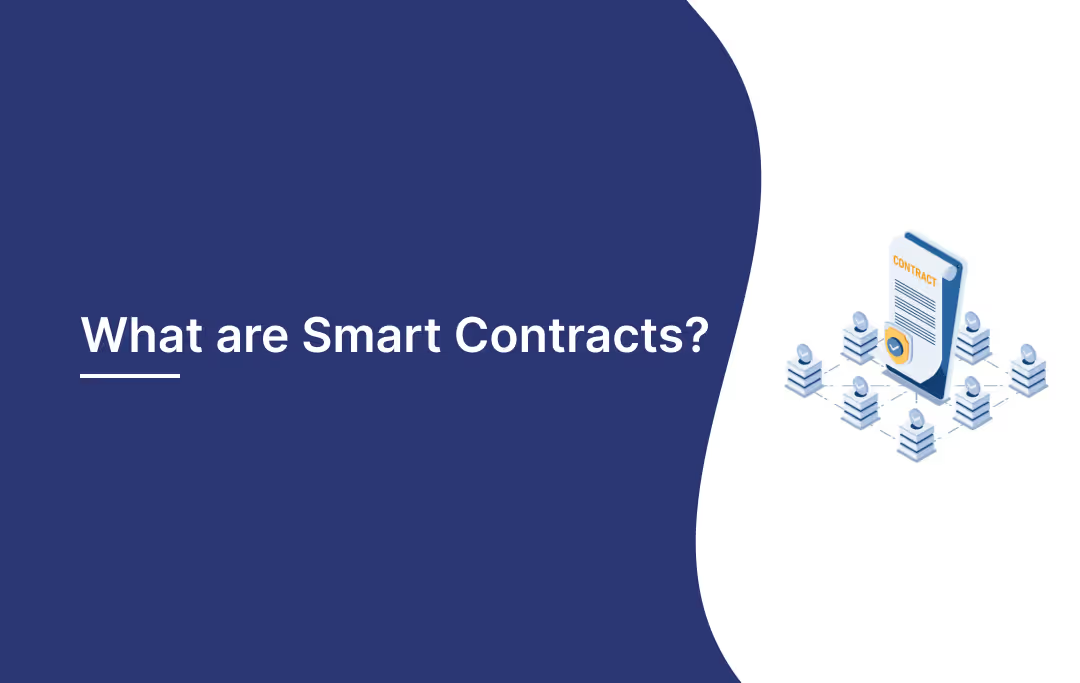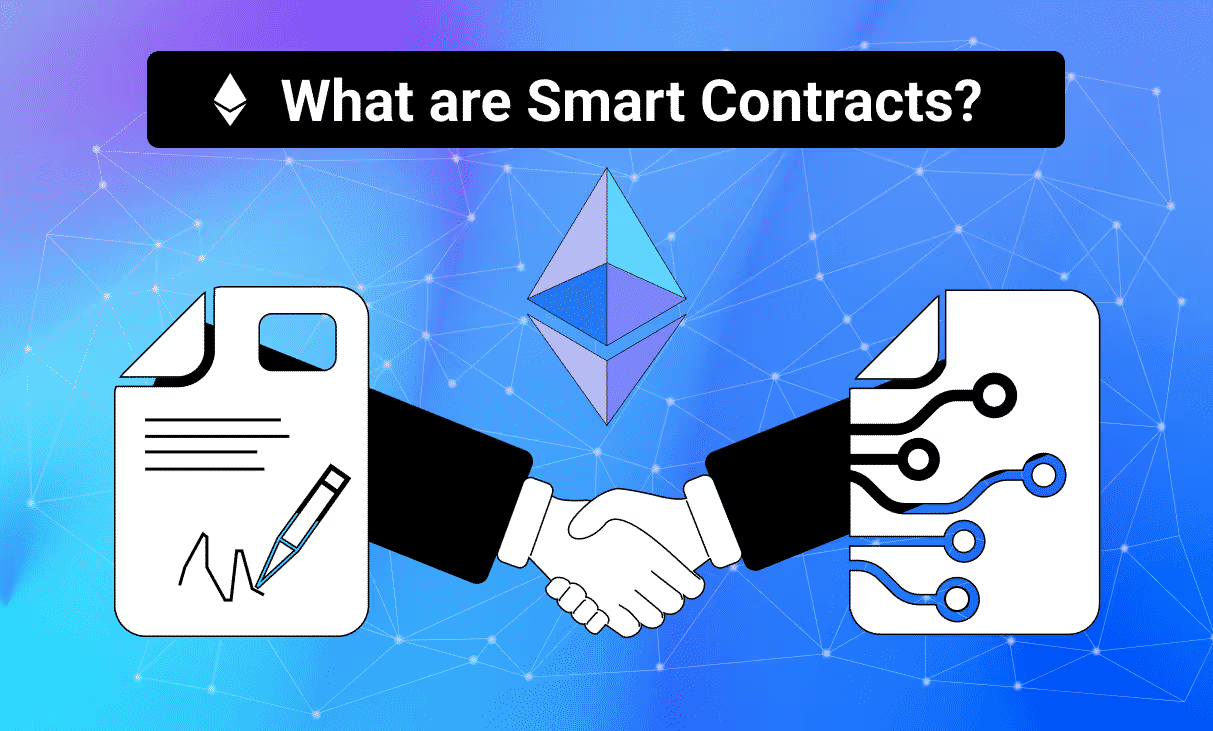.avif)
Calculate Your Crypto
Taxes in Minutes

As technology continues to revolutionize the world of finance, new concepts like smart contracts are redefining how we handle and secure transactions.
In this blog, we provide you with a deep understanding of smart contracts, their working mechanisms, and their intersection with tax considerations.
But first, let’s dive into the basics of this transformative technology.
What is a Smart contract?
A smart contract is a self-executing contract with the terms of the agreement between parties directly written into lines of code.
These are essentially digital contracts built on blockchain technology. They contain specific rules and conditions, encoded directly within the contract's code. When these predefined conditions are met, the smart contract self-executes, automating the next actions without requiring any manual intervention or third-party oversight.

If 'Condition A' is met, then 'Outcome B' is automatically triggered. For instance, consider a real estate transaction. A smart contract can be set up where, once a buyer transfers the agreed purchase amount (Condition A), the digital ownership title of the property is automatically sent to the buyer (Condition B). This transaction happens directly between buyer and seller, eliminating the need for intermediaries, making the process more efficient and secure.
What are the Types of Smart Contracts?
There are several types of smart contracts that can be utilized based on the requirements and conditions of a transaction. Here's a closer look:
Smart Legal Contracts
These are legally binding smart contracts that impose contractual obligations on all involved parties. Any breach of these contracts could result in serious legal consequences.
These types of smart contracts ensure both accountability and compliance, providing a digital and automated twist to traditional legal contracts.
Decentralized Autonomous Organizations (DAO)
At the core of a DAO is its governing smart contract, which dictates the specific rules and guidelines of the organization. These contracts, embedded within the blockchain, operate with pre-established governance mechanisms.
DAOs can vary in complexity based on the number of stakeholders involved. Being open-source, transparent, and theoretically incorruptible, DAOs replace manual community actions with automated, self-enforcing codes.
Application Logic Contracts (ALC)
These smart contracts are designed to facilitate secure and autonomous operation of devices. ALCs enhance automation, reduce transaction costs, and improve scalability.
They contain application-specific code that interfaces with other smart contracts on the blockchain. This interconnectivity is particularly useful in the integration of different technologies, such as the Internet of Things (IoT) with blockchain.
How does a smart contract work?
The execution of smart contracts relies on the decentralized and immutable nature of blockchain. They function by employing the deterministic execution of pre-defined rules and penalties around an agreement, as automated by its code.

Each smart contract is stored on the blockchain, and its execution is validated by every node in the network.
The transaction only gets added to the blockchain after a consensus is reached among the nodes, ensuring fairness and accuracy. This chain of operations eliminates the need for intermediaries, thereby enhancing the efficiency of these agreements.
Once deployed on the blockchain, it cannot be altered or tampered with, ensuring a high level of trust and security. This assurance further aids in reducing fraud and breaches of contract.
What are the benefits of smart contracts?
Smart contracts offer an array of benefits including:
1. Autonomy: They eliminate the need for intermediaries giving parties direct control over the agreement.
2. Trust: The tamper-proof nature of smart contracts fosters trust among parties.
3. Backup: Blockchain stores duplicates of all smart contracts, preventing loss of information.
4. Speed and Efficiency: Automated processes enhance speed and efficiency, saving time and costs associated with manual processing.
5. Transparency: The terms of smart contracts are visible and accessible to all relevant parties, enabling clear communication.
6. Security: Utilizing cryptography for encryption, smart contracts offer top-notch security against fraud and hacks.
Smart Contracts and Tax
As discussed previously, smart contracts play a crucial role in facilitating various transactions on the blockchain. These transactions, such as buying, selling, swapping, or depositing assets, carry their own tax implications.
To ensure compliance, you must accurately handle the tax calculations associated with smart contract transactions. This is where a crypto tax software like Kryptos can help.
By assessing the programming logic embedded within the smart contract, Kryptos applies the most suitable auto-categorization when importing these transactions into the application. This process ensures that the tax treatment of each transaction is appropriately accounted for, taking into consideration the specific actions associated with the transactions.
Want to get started? Sign Up on Kryptos now.
FAQs
1. What is a smart contract in simple terms?
A smart contract is a digital agreement where terms and conditions are written in code. When these terms are met, the contract self-executes, meaning it carries out whatever actions it was designed to do.
2. What is a smart contract and how does it work?
A smart contract is a computerized protocol that facilitates, verifies, or enforces the negotiation or performance of a contract. In essence, it is a computer program that directly controls the transfer of digital currencies or assets between parties under certain conditions.
It works on the "if-then" principle. For example, in a rental agreement, if a tenant (party A) pays the rent (condition), then they receive the digital key to the rented property (outcome). These contracts are stored and replicated on the blockchain and supervised by the network of computers that run the blockchain.
3. What is a smart contract vs blockchain?
Blockchain is the foundational technology that enables the existence of smart contracts. It is a distributed ledger that records transactions across multiple computers so that any involved record cannot be altered retroactively, without the alteration of all subsequent blocks.
Smart contracts are an application that operates on top of a blockchain. They use the blockchain's decentralized ledger to validate and enforce their terms. While all smart contracts require a blockchain to function, a blockchain can exist without smart contracts.
4. What are the types of smart contracts?
There are three types of smart contracts: Smart Legal Contracts, Decentralized Autonomous Organizations (DAO), and Application Logic Contracts (ALC).
5.What are the 3 characteristics of smart contracts?
Smart contracts have the following 3 characteristics:
- Self-Verifying: Smart contracts can automatically verify whether conditions have been met and execute the next steps.
- Tamper-Proof: Once a smart contract is deployed on the blockchain, it cannot be modified or tampered with.
- Autonomy: Smart contracts are self-executing, meaning they can perform the tasks they were designed for without any intermediaries.
All content on Kryptos serves general informational purposes only. It's not intended to replace any professional advice from licensed accountants, attorneys, or certified financial and tax professionals. The information is completed to the best of our knowledge and we at Kryptos do not claim either correctness or accuracy of the same. Before taking any tax position / stance, you should always consider seeking independent legal, financial, taxation or other advice from the professionals. Kryptos is not liable for any loss caused from the use of, or by placing reliance on, the information on this website. Kryptos disclaims any responsibility for the accuracy or adequacy of any positions taken by you in your tax returns. Thank you for being part of our community, and we're excited to continue guiding you on your crypto journey!
| Step | Form | Purpose | Action |
|---|---|---|---|
| 1 | 1099-DA | Reports digital asset sales or exchanges | Use to fill out Form 8949. |
| 2 | Form 1099-MISC | Reports miscellaneous crypto income | Use to fill out Schedule 1 or C. |
| 3 | Form 8949 | Details individual transactions | List each transaction here. |
| 4 | Schedule D | Summarizes capital gains/losses | Transfer totals from Form 8949. |
| 5 | Schedule 1 | Reports miscellaneous income | Include miscellaneous income (if not self-employment). |
| 6 | Schedule C | Reports self-employment income | Include self-employment income and expenses. |
| 7 | Form W-2 | Reports wages (if paid in Bitcoin) | Include wages in total income. |
| 8 | Form 1040 | Primary tax return | Summarize all income, deductions, and tax owed. |
| Date | Event/Requirement |
|---|---|
| January 1, 2025 | Brokers begin tracking and reporting digital asset transactions. |
| February 2026 | Brokers issue Form 1099-DA for the 2025 tax year to taxpayers. |
| April 15, 2026 | Deadline for taxpayers to file their 2025 tax returns with IRS data. |
| Timeline Event | Description |
|---|---|
| Before January 1, 2025 | Taxpayers must identify wallets and accounts containing digital assets and document unused basis. |
| January 1, 2025 | Snapshot date for confirming remaining digital assets in wallets and accounts. |
| March 2025 | Brokers begin issuing Form 1099-DA, reflecting a wallet-specific basis. |
| Before Filing 2025 Tax Returns | Taxpayers must finalize their Safe Harbor Allocation to ensure compliance and avoid penalties. |
| Feature | Use Case Scenario | Technical Details |
|---|---|---|
| Automated Monitoring of Transactions | Alice uses staking on Ethereum 2.0 and yield farming on Uniswap. Kryptos automates tracking of her staking rewards and LP tokens across platforms. | Integrates with Ethereum and Uniswap APIs for real-time tracking and monitoring of transactions. |
| Comprehensive Data Collection | Bob switches between liquidity pools and staking protocols. Kryptos aggregates all transactions, including historical data. | Pulls and consolidates data from multiple sources and supports historical data imports. |
| Advanced Tax Categorization | Carol earns from staking Polkadot and yield farming on Aave. Kryptos categorizes her rewards as ordinary income and investment income. | Uses jurisdiction-specific rules to categorize rewards and guarantee compliance with local tax regulations. |
| Dynamic FMV Calculation | Dave redeems LP tokens for Ethereum and stablecoins. Kryptos calculates the fair market value (FMV) at redemption and during sales. | Updates FMV based on market data and accurately calculates capital gains for transactions. |
| Handling Complex DeFi Transactions | Eve engages in multi-step DeFi transactions. Kryptos tracks value changes and tax implications throughout these processes. | Manages multi-step transactions, including swaps and staking, for comprehensive tax reporting. |
| Real-Time Alerts and Updates | Frank receives alerts on contemporary tax regulations affecting DeFi. Kryptos keeps him updated on relevant changes in tax laws. | Observe regulatory updates and provide real-time alerts about changes in tax regulations. |
| Seamless Tax Reporting Integration | Grace files taxes using TurboTax. Kryptos integrates with TurboTax to import staking and yield farming data easily. | Direct integration with tax software like TurboTax for smooth data import and multi-jurisdictional reporting. |
| Investor Type | Impact of Crypto Tax Updates 2025 |
|---|---|
| Retail Investors | Standardized crypto reporting regulations make tax filing easier, but increased IRS visibility raises the risk of audits. |
| Traders & HFT Users | To ensure crypto tax compliance, the IRS is increasing its scrutiny and requiring precise cost-basis calculations across several exchanges. |
| Defi & Staking Participants | The regulations for reporting crypto transactions for staking rewards, lending, and governance tokens are unclear, and there is a lack of standardization for decentralized platforms. |
| NFT Creators & Buyers | Confusion over crypto capital gains tax in 2025, including the taxation of NFT flips, royalties, and transactions across several blockchains. |
| Crypto Payments & Businesses | Merchants who take Bitcoin, USDC, and other digital assets must track crypto capital gains for each transaction, which increases crypto tax compliance requirements. |
| Event | Consequences | Penalties |
|---|---|---|
| Reporting Failure | The tax authorities can mark uncontrolled revenues and further investigate. | Penalty fines, interest on unpaid taxes and potential fraud fees if they are deliberately occurring. |
| Misreporting CGT | Misreporting CGT Error reporting profits or losses can trigger the IRS audit. | 20% fine on under -ported zodiac signs, as well as tax and interest. |
| Using decentralized exchanges (DEXs) or mixers without records | The IRS can track anonymous transactions and demand documentation. | Possible tax evasion fee and significant fine. |
| Disregarding Bitcoin mining tax liabilities | Mining reward is considered taxable income, and failure of the report can be regarded as tax fraud. | Further tax obligations, punishment and potential legal steps. |
| Foreign crypto holdings: Non-disclosure | Foreign-accepted crypto FATCA may be subject to reporting rules. | Heavy fines (up to $ 10,000 per fracture) or prosecution for intentional non-transport. |
File Your Crypto Tax in Minutes







.avif)